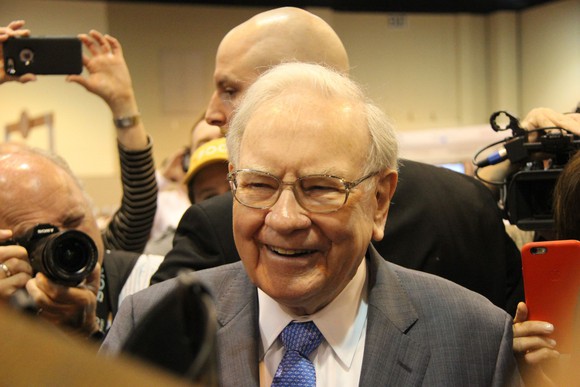The Oracle of Omaha has done a great job of beating the market, but he doesn’t think everyone should try to do the same.
Because of this, many investors look to Buffett for market-beating advice that they can use in their own portfolios, and here’s what Buffett has said about the topic over the past year or so.
Beating the market is hard to do consistently
First of all, it’s important to point out that even the best investors don’t beat the market year after year. Even Buffett has his bad years — in fact, Berkshire underperforms the S&P 500 about once every three years.
Second, it’s been well-documented that the average investor underperforms the market by a considerable margin, and a big reason is the tendency to invest emotionally and try to time the market. Buffett has said, as many experts have, that trying to time the market is a losing battle. In an interview earlier in 2017, Buffett went so far as to say that attempting to pick times to buy and sell is a mistake for 99% of the population.
In addition, Buffett has said that choosing individual stocks is a mistake for many people. And, it makes sense. The majority of Americans don’t have the time, knowledge, or desire required to research and properly construct a stock portfolio. If you do have those things, it’s certainly possible to do well. If you don’t, however, that leaves two basic ways to invest: passively managed index funds or actively managed mutual funds and hedge funds.
According to Buffett, here’s how not to try to beat the market
Buffett’s main problem with investors who try to beat the market isn’t with people who take the time to research stocks and construct a portfolio of attractively valued companies. This is how Buffett became wealthy.
Instead, Buffett’s biggest issue is with people who try to beat the market by entrusting their money to managers of actively managed mutual funds, or worse, hedge funds. For decades, it has been a common misconception that hedge funds are a tool that rich people use to generate exceptional returns.
Buffett’s thesis is that these investors are at an inherent disadvantage because of the high fees charged by these types of investment products. In his 2016 letter to Berkshire Hathaway shareholders, Buffett did an excellent job of explaining his reasoning:
“If Group A (active investors) and Group B (do-nothing investors) comprise the total investing universe, and B is destined to achieve average results before costs, so, too, must A. Whichever group has the lower costs will win…And if Group A has exorbitant costs, its shortfall will be substantial.”
In other words, “do-nothing investors,” by which Buffett means investors who simply choose low-cost index funds, will, by definition, match the market’s performance. As a whole, the same can be said about active fund managers. Some managers will beat the market in a given year, and some will underperform, but when you factor the high fees into the equation, investors in actively managed funds are at a big disadvantage. In fact, Buffett estimates that wealthy people who have followed Wall Streeters’ investment advice have wasted more than $100 billion over the past decade.
Buffett’s point is that the only likely winners in these arrangements are the managers. Because of this, the best investment the average American investor can make is in low-cost index funds.
The bottom line
To sum up Buffett’s message, it’s that beating the market on a consistent basis isn’t likely to happen for most investors, especially those who utilize actively managed investment products. With the discipline, knowledge, and time necessary to research stocks, some individual investors could beat the market over time, but for the majority of people, index funds are the way to go. These low-cost investment products virtually guarantee that investors will match the market’s performance, which has been quite good over long periods of time.
10 stocks we like better than Berkshire Hathaway (A shares)
When investing geniuses David and Tom Gardner have a stock tip, it can pay to listen. After all, the newsletter they have run for over a decade, Motley Fool Stock Advisor, has tripled the market.*
David and Tom just revealed what they believe are the ten best stocks for investors to buy right now… and Berkshire Hathaway (A shares) wasn’t one of them! That’s right — they think these 10 stocks are even better buys.
*Stock Advisor returns as of September 5, 2017
Matthew Frankel owns shares of Berkshire Hathaway (B shares). The Motley Fool owns shares of and recommends Berkshire Hathaway (B shares). The Motley Fool has a disclosure policy.














